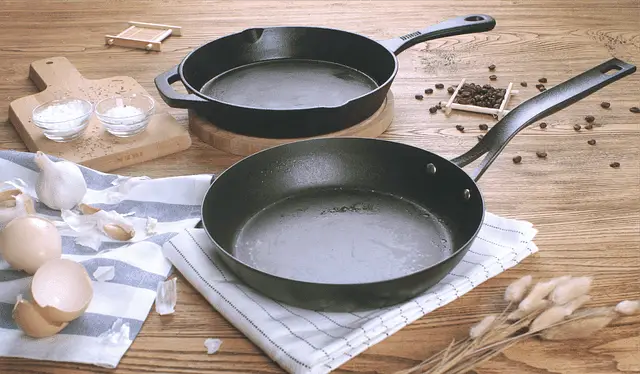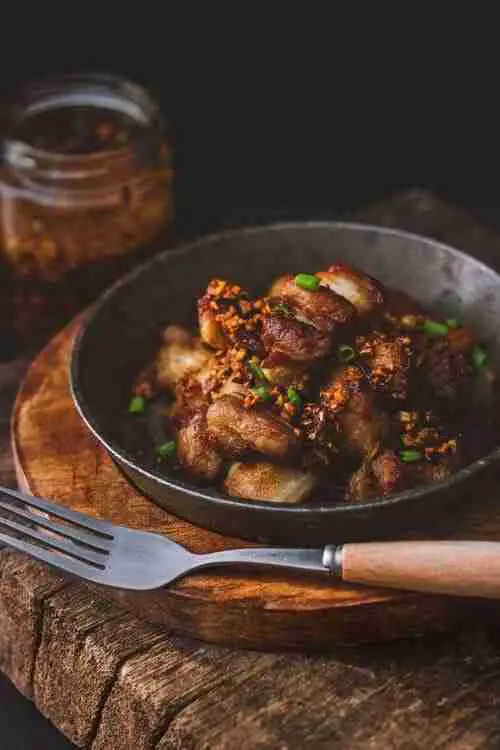If you enjoy cooking as much as I do and own a cast iron pot or pan, you’ll agree that it’s one of the most adaptable pieces of cookware, thanks to its numerous benefits. Cast iron is also highly cost-effective. As a result, acquiring it will be less expensive.
I think we’ve sung cast iron’s praises enough. It’s critical to understand that every product has advantages and disadvantages, no matter how flawless it is. So, what are cast iron cookware advantages and disadvantages?
This post is for you if you’re thinking about buying cast iron but are apprehensive since you’re not sure what the benefits and drawbacks are. Not only will we cover the benefits and drawbacks of cast iron, but we’ll also go through how to season and care for it.
WHAT IS CAST IRON COOKWARE MADE OF?
Cast iron is simply an iron alloy containing 2 to 4% carbon, varying amounts of silicon and manganese, and traces of impurities such as sulfur and phosphorus.
Cast iron is made by reducing iron ore in a blast furnace, then casting or pouring and hardening the liquid iron into crude ingots called pigs, which are then re-melted with scrap and alloying elements in cupola furnaces and recast into molds for a variety of products.
Cast iron is brittle and can be used for numerous applications because of its relatively low melting point, good fluidity, resistance to deformation, and wear resistance.
Cast iron material can be used in:
- Pipes
- Machines
- Automotive industry parts
- Kitchen and household appliances like cookware
The reason why cast iron material is used in the manufacturing of cookware is that:
- Good heat retention
- Durable
- Can be used at very high temperatures
- Can be seasoned to protect it from rust
- Can be seasoned to have a non-stick cooking surface.
Finally, the types of cast iron cookware include;
- Cast iron frying pans
- Waffle irons
- Deep fryers
- Flattop grills
- Crepe makers etc.
CAST IRON COOKWARE ADVANTAGES AND DISADVANTAGES

To begin, cast iron cookware is classified into two types. We have regular cast iron cookware as well as enameled cast iron cookware. The difference is that one has a coating, whereas the other is in its natural state.
For the purposes of this article, I will list the 9 advantages and 7 disadvantages of regular or raw cast iron cookware below:
| ADVANTAGES OF CAST IRON COOKWARE | DISADVANTAGES OF CAST IRON COOKWARE |
| Heat distribution is excellent and can still be cooking even when the heat source is removed. | Cast iron cookware is heavy and unsuitable for the elderly or senior citizens, especially when fully loaded. |
| Because cast iron cookware can be easily moved from stovetop to oven, it has a high level of caramelization. | To avoid rust, it requires extra care and maintenance such as seasoning and re-seasoning. |
| Cast iron cookware is ideal for indoor and, in particular, outdoor cooking. | The surface of cast iron cookware gets extremely hot, so use an oven mitt to avoid getting burned. |
| Cast iron cookware is durable and versatile and can be used for cooking, searing, roasting, baking, and frying. | Cleaning takes time. |
| Keeps food hot and warm for an extended period of time. | Because it is made of iron, season your cast iron cookware properly to reduce iron leaching, especially if you are preparing acidic foods. |
| With proper care, they are inexpensive and can last a long time. | If you place hot cast iron in cold running water too quickly, it may crack. |
| Cast iron cookware is suitable for use on all types of stovetops, including gas, grill, oven, and even campfire. | Obviously, regular cast iron isn’t nonstick, so expect food to burn. However, if seasoned properly, it will form a protective layer or a non-stick surface. |
| Because cast iron retains heat so well, it can produce crispy fried chicken and flavorful roasted vegetables. | |
| You can use metal cooking utensils on cast iron cookware instead of just wooden or silicone, and there’s no need to worry about chipping the bare surface. |
RELATED: CAST IRON VS TEFLON VS CERAMIC COOKWARE
RELATED: IS BLACK RESIDUE ON CAST IRON SKILLET HARMFUL?
HOW TO SEASON CAST IRON COOKWARE
Before we get into how to season cast iron cookware, let’s first discuss why seasoning cast iron cookware is important:
- Seasoning creates a natural, easy-release cooking surface and prevents rusting of your pan.
- A well-seasoned cast iron pan will last for generations with a little extra care.
- It imparts a classic black patina to your cookware.
One cast-iron cookware I know that comes seasoned is the Lodge cast iron which is ready for use right out of the box.
There are two methods for keeping the seasoning on your cast iron skillet. Cooking with it is the simplest method. Every time you cook with oil, you may be adding another layer of seasoning to the dish.
Second, you can use the oven to season your cast iron cookware. This method applies a thicker layer of seasoning to the entire pan, thereby strengthening the bond with the iron.
Follow the instructions below to season your cast iron:
- Clean or Scrub your pan: Warm, soapy water should be used to scrub the pan. Because you’re going to re-season the cookware, it’s fine to use soap. Thoroughly rinse and hand-dry.
- Apply oil to the cookware: Apply a thin, even layer of cooking oil to the cookware (inside and out). Your cookware may become sticky if you use too much oil.
- Place the cookware upside down in the oven. On the bottom rack, place a large baking sheet or aluminum foil. Bake for one hour at 450-500 degrees F. Allow to cool before storage.
Furthermore, there have been arguments about the kind of oil to use for seasoning or re-seasoning your cast iron cookware. Almost all fat and cooking oil can be used for seasoning.
However, we recommend you stick with the one that has proven over time to be effective for you. Examples of seasoning oil include; flaxseed oil, vegetable oil, melted shortening, canola oil, grape seed oil, avocado oil, and Lodge seasoning spray. Etc.
It is important to note that performing some cooking activities on your regular cast iron cookware, such as cooking acidic foods, using high heat, or scrubbing with abrasive utensils or scouring pads, may remove some seasoning.
Finally, when restoring a rusted cast iron skillet, pan, or cookware, we recommend using the oven seasoning method. The video below will show you how to properly season and restore rusted cast iron cookware.
ENAMELED CAST IRON COOKWARE PROS AND CONS
We have several pros and cons of enameled cast iron cookware, which I have discussed in another separate article.
However, to give you a hint, one advantage of enameled cast iron cookware is that it has a coating that makes it easier to clean than regular cast iron cookware, while one disadvantage is that it cannot be used on the grill or campfire like regular cast iron cookware.
IS CAST IRON GOOD FOR HEALTH?

Glass cookware without lead, stainless steel cookware, particularly 18/10, cast iron, and 100 percent pure ceramic cookware are examples of healthy living cookware materials.
There have been some misconceptions about cast iron leaching a large amount of iron into food, especially acidic foods, but this can be avoided by properly seasoning your cast iron, which helps with a protective layer.
Furthermore, let’s not forget that for individuals who are deficient in iron, using cast iron for preparing food is beneficial to them.
Aside from that, most consumers are wary of cast iron cookware brands that do not adhere to standards, such as using chemical-leaded paint to achieve a black sheen.
However, I can assure you that the seasoning on Lodge cast iron cookware made in the United States is 100 percent natural, making it safe for use and for our health.
Another reason cast iron cookware is healthy is that it uses less oil when cooking and it isn’t manufactured with dangerous chemicals like PFOA and PFTE.
CASK IRON SKILLET CANCER
The use of hazardous chemicals in the manufacture of cookware and dinnerware products has been linked to cancer.
Are chemicals used in the production of cast iron skillets? Do they contain toxins that are harmful to our health? The short answer is NO because certain standards and processes are followed when manufacturing cast iron.
Second, cast iron is one of the oldest methods of cooking, similar to using an open flame to cook. I have yet to come across any concrete scientific evidence that cast iron causes cancer in humans.
It is recommended that you avoid all antique enameled cast iron cookware made between 1800 and 1900 because the methods used in their manufacture contain lead and cadmium, which can cause cancer if consumed on a regular basis.
Antique or vintage enameled cast iron should only be used as a decorative item in our homes.
Finally, if you are concerned that your cast iron may contain harmful chemicals, we recommend that you consult with a professional lab scientist who can perform standard tests and tell you about the materials and the effects they will have on your body.
WHICH IS BETTER FOR COOKING CAST IRON OR IRON?
Finally, we can’t discuss cast iron cookware advantages and disadvantages without first understanding the distinction between cast iron and pure/raw or ordinary iron cookware.
Food enthusiasts frequently inquire, “Which is better for cooking: cast iron or iron?” For starters, cast iron is an alloy, whereas raw or pure iron is made entirely of iron. An alloy is a metal mixture made up of 97 percent iron, 3 percent carbon, and silicone.
Iron is a better heat conductor than cast iron cookware.
Iron is formed by beating iron sheets into the desired shape, whereas cast iron is formed in a molten blast furnace.
Cast iron has higher heat retention than raw iron.
When compared to iron cookware, cast iron cookware is heavier.
In contrast, to cast iron, which is free of impurities and toxins, some iron may contain lead or cadmium.
Both require upkeep, care, and seasoning. They require oil to keep it from rusting.
Now, as to which is better, that will depend on your preferences, cooking style, recipes you prepare frequently and taste, and the outcome you want to achieve.
REFERENCE: LE CREUSET CAST IRON